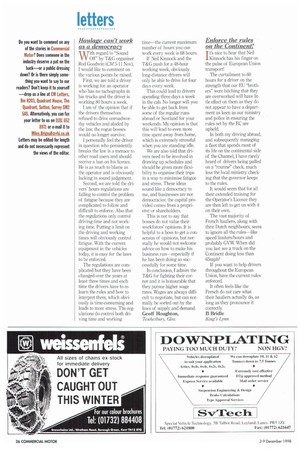letters
Page 28

If you've noticed an error in this article please click here to report it so we can fix it.
Do you want to comment on any of the stories in Commercial Motor? floes someone in the industry deserve a pat on the back—or a public dressing down? Or is there simply something you want to say to our readers? Don't keep it to yourself —drop us a line at CM letters, Rm H203, Quadrant House, The Quadrant, Sutton, Surrey SM2 5AS. Alternatively, you can fax your letter to us on 0181 652 8971 or e-mail it to Miles.Brignall@rbi.co.uk letters may be edited for length and do not necessarily represent the views of the editor.
Haulage can't work as a democracy
With regard to "Sound Off" by T&G organiser Rod Goodwin (CM 5-11 Nov),
would like to comment on the various points he raised.
First, we are told a driver is working for an operator who has no tachographs in his trucks and the driver is working 80 hours a week, am of the opinion that if the drivers themselves refused to drive unroadworthy vehicles and abided by the law, the rogue bosses would no longer survive.
I personally feel the driver in question who persistently breaks the law is a menace to other road users and should receive a ban on his licence. He is as much to blame as the operator and is obviously lacking in sound judgement.
Second, we are told the drivers' hours regulations are failing to control the problem of fatigue because they are complicated to follow and difficult to enforce. Also that the regulations only control driving time and not working time. Putting a limit on the driving and working times will obviously control fatigue. With the current equipment in the vehicles today, it is easy for the laws to be enforced.
The regulations are complicated but they have been changed over the years at least three times and each time the drivers have to relearn the rules and how to interpret them, which obviously is time-consuming and leads to more stress. The reg. ulations do control both driving tinle and working
time—the current maximum number of hours you can work every week is 68 hours, If Neil Kinnock and the T&G push for a 48-hour working week, obviously long-distance drivers will only be able to drive for four days every week. This could lead to drivers spending three days a week in the cab. No longer will you he able to get back from some of the regular runs abroad or Scotland for your weekends. My opinion is that this will lead to even more time spent away from home, which is extremely stressful when you are standing idle.
We are also told that drivers need to be involved in drawing up schedules and should be given more flexibility to organise their trips in a way to minimise fatigue and stress. These ideas sound like a democracy to me, and businesses are not democracies: the capital provided comes from a proprietor or shareholders.
This is not to say that bosses do not value their workforces' opinions. lt is helpful to a boss to get a consensus of opinions, but normally he would not welcome advice on how to make his business run—especially if he has been doing so successfully for some time.
In conclusion, I admire the T&G for fighting their corner and it is honourable that they pursue higher wage rates. Wages are always difficult to negotiate, but can normally be sorted out by the laws of supply and demand. Geoff Houghton, Tiwkesbury, Glos.






















































































































